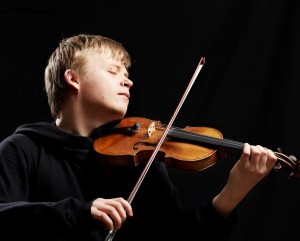Kuusisto and Muhly bring a folklike simplicity to poisson rouge
Pekka Kuusisto is not your standard classical violinist.
Taking the stage without announcement or applause at (le) poisson rouge Friday night, the unassuming Kuusisto and composer/pianist Nico Muhly presented a program of works by Bach, Pärt, Glass, and Muhly himself. The two men are both part of a new generation of fashionable, genre-hopping classical musicians. It will come as no surprise then that Kuusisto, who can be heard performing and improvising with noise, electronic, and jazz groups, as well as with major orchestras, would perform classical music with a different approach.
The centerpiece of the evening, which was presented without printed programs, was Bach’s Violin Partita No. 2 in D minor. The movements were separated and paired with a contemporary work, which would flow directly without pause or break from the Bach.
Pekka Kuusisto’s Bach is unique. It isn’t the sort that you hear in conservatories or in concert halls or on major recordings. The sound was thin in the opening of the allemande, and it was effortless – his bow just barely gliding on the strings. There was no hurry or need to go directly from one note to the next. It was not about the notes themselves, it was about moving between them. The space in between was often breathless, lending a unique motion to the phrasing, and there was always a delicacy to the sound. The result was a purely personal Bach, without academic traces, and it was striking.
One could have blinked and missed the transition into the second piece – Arvo Pärt’s Fratres. The sound of Bach hadn’t even finished, and Muhly had already begun. Somehow, in the moment, the Bach and Pärt seemed exactly alike. Despite the nature of the venue, which serves food and drink during the performances, the silence was hushed, and the emotional responses palpable during these contemporary works.
But despite the Pärt and Philip Glass’ The Orchard being easy emotional triggers, it was the epic final movement of the Bach that received the biggest response. The famous Chaconne, was the only portion of the evening for which Muhly left the stage, but Kuusisto never let the grandeur of the music overtake him. Like the earlier movements, his playing was unhurried, and even during the quick passagework, Kuusisto made sure each note was significant. The thick chords were raw and played roughly The phrasing breathed. The colors were varied. And there was momentous beauty in the imperfection of it all.
The program closed with the pair improvising on two Finnish folk songs. Kuusisto’s charming personality became even more apparent as he lovingly sang in his native language. Strumming his violin like a guitar, Kuusisto’s style-crossing roots were plain.



